目录
- thymeleaf模板引擎中th:if的使用
- th:if 条件判断
- th:if 判断表达式
- Thymeleaf模板引擎语法使用
- 1、模板引擎thymeleaf使用
- 2、ognl表达式的语法糖
- 3、拼接
- 4、运算
- 5、循环
- 6、逻辑判断
- 7、分支控制switch
- 8、JS模板
thymeleaf模板引擎中th:if的使用
th:if 条件判断
很多时候只有在满⾜某个条件时,才将⼀个模板⽚段显示在结果中,否则不进行显示。比如只有当用户有订单时,才为它显示订单链接,否则不显示。th:if 属性用于满足这个需求
<body>
<!--if属性结果为 true,模板会进行显示-->
<p th:if="true">th:if="true"</p>
<!--if属性结果为 false,模板不会进行显示-->
<p th:if="false">th:if="false"</p>
<!--后台控制器传出数据:model.addAttribute("isMarry", true);-->
<p th:if="${isMarry}">已婚</p>
</body>
th:if 属性不仅只以布尔值作为判断条件,它将按照如下规则判定指定的表达式结果为 true:
- 如果表达式结果为布尔值,则为 true 或 false
- 如果表达式的值为 null,th:if 将判定此表达式为 false
- 如果值是数字,为 0 时,判断为 false;不为零时,判定为 true
- 如果值是是 String,值为 “false”、“off”、“no” 时,判定为 false,否则判断为 true,字符串为空时,也判断为 true
- 如果值不是布尔值,数字,字符或字符串的其它对象,只要不为 null,则判断为 true
<body>
<!--表达式的结果为布尔类型时,if 直接以它为结果-->
<p th:if="true">th:if="true"</p>
<!--当表达式结果为null时,则if判定为false-->
<p th:if="null">th:if="null"</p>
<!--表达式为数字时,不为0,if判定为true,为0,时,if判定为false-->
<p th:if="11">th:if="11"</p>
<p th:if="0">th:if="0"</p>
<!--表达式结果为字符串时,如果为 true,则if判定为true;值为 false,则if判定为false-->
<!--结果为 off、no 等特殊字符串时,if 判定为false-->
<p th:if="'true'">th:if="'true'"</p>
<p th:if="'false'">th:if="'false'"</p>
<p th:if="'off'">th:if="'off'"</p>
<p th:if="'no'">th:if="'no'"</p>
<!--表达式结果字符串不为false,off,no时,if判定为true-->
<p th:if="'Love China'">th:if="'Love China'"</p>
<!--后台传输:model.addAttribute("userList", User.getUsers());-->
<!--只要 userList 不等于null,则if判定为true,否则为false-->
<p th:if="${userList}">th:if="${userList}"</p>
<!--后台传输:model.addAttribute("name", "");-->
<!--字符串为空时,if判定为 true-->
<p th:if="${name}eq''">name 等于空</p>
<p th:if="${name}">th:if="${name}"</p>
</body>
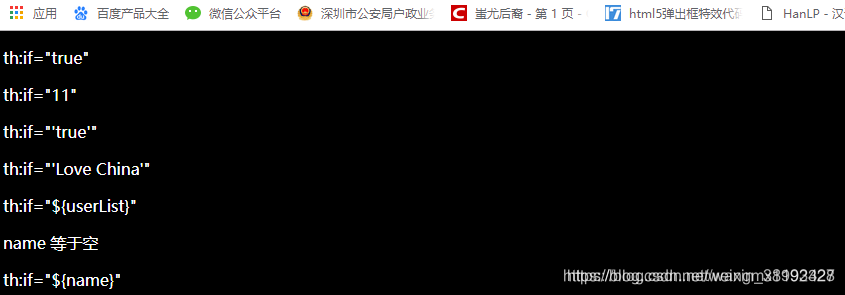
th:if 判断表达式
gt:(大于)>ge:(大于等于)>=eq:(等于)==lt:(小于)<le:(小于等于)<=ne:(不等于)!=
Thymeleaf模板引擎语法使用
1、模板引擎thymeleaf使用
引入依赖:
<dependency> <groupId>org.springframework.boot</groupId> <artifactId>spring-boot-starter-thymeleaf</artifactId> </dependency>
页面导入头部文件:
<html xmlns:th="http://www.thymeleaf.org">
语法说明:
Thymeleaf通过 ${}来获取model中的变量,注意这不是el 表达式,而是ognl表达式,但是语法非常像。
2、ognl表达式的语法糖
刚才获取变量值,我们使用的是经典的对象.属性名方式。但有些情况下,我们的属性名可能本身也是变量,怎么办?
ognl提供了类似js的语法方式:
例如:${user.name} 可以写作${user['name']}
自定义变量
场景
看下面的案例:
<h2>
<p>Name: <span th:text="${user.name}">Jack</span>.</p>
<p>Age: <span th:text="${user.age}">21</span>.</p>
<p>friend: <span th:text="${user.friend.name}">Rose</span>.</p>
</h2>
我们获取用户的所有信息,分别展示。
当数据量比较多的时候,频繁的写user.就会非常麻烦。
因此,Thymeleaf提供了自定义变量来解决:
示例:
<h2 th:object="${user}">
<p>Name: <span th:text="*{name}">Jack</span>.</p>
<p>Age: <span th:text="*{age}">21</span>.</p>
<p>friend: <span th:text="*{friend.name}">Rose</span>.</p>
</h2>
首先在 h2上 用 th:object="${user}"获取user的值,并且保存
然后,在h2内部的任意元素上,可以通过 *{属性名}的方式,来获取user中的属性,这样就省去了大量的user.前缀了
3、拼接
我们经常会用到普通字符串与表达式拼接的情况:
<span th:text="'欢迎您:' + ${user.name} + '!'"></span>
字符串字面值需要用'',拼接起来非常麻烦,Thymeleaf对此进行了简化,使用一对|即可:
<span th:text="|欢迎您:${user.name}|"></span>
与上面是完全等效的,这样就省去了字符串字面值的书写。
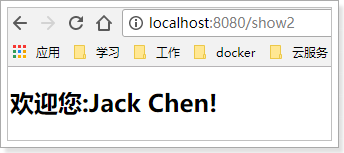
4、运算
需要注意:${}内部的是通过OGNL表达式引擎解析的,外部的才是通过Thymeleaf的引擎解析,因此运算符尽量放在${}外进行。
算术运算
支持的算术运算符:+ - * / %
<span th:text="${user.age}"></span>
<span th:text="${user.age}%2 == 0"></span>
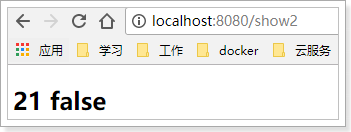
比较运算
支持的比较运算:>, <, >= and <= ,但是>, <不能直接使用,因为xml会解析为标签,要使用别名。
注意 == and !=不仅可以比较数值,类似于equals的功能。
可以使用的别名:gt (>), lt (<), ge (>=), le (<=), not (!). Also eq (==), neq/ne (!=).
条件运算
三元运算
<span th:text="${user.sex} ? '男':'女'"></span>
三元运算符的三个部分:conditon ? then : else
-
condition:条件 -
then:条件成立的结果 -
else:不成立的结果
其中的每一个部分都可以是Thymeleaf中的任意表达式。

默认值
有的时候,我们取一个值可能为空,这个时候需要做非空判断,可以使用 表达式 ?: 默认值简写:
<span th:text="${user.name} ?: '二狗'"></span>
当前面的表达式值为null时,就会使用后面的默认值。
注意:?:之间没有空格。

5、循环
循环也是非常频繁使用的需求,我们使用th:each指令来完成:
假如有用户的集合:users在Context中。
<tr th:each="user : ${users}">
<td th:text="${user.name}">Onions</td>
<td th:text="${user.age}">2.41</td>
</tr>
${users}是要遍历的集合,可以是以下类型:Iterable,实现了Iterable接口的类Enumeration,枚举Interator,迭代器Map,遍历得到的是Map.EntryArray,数组及其它一切符合数组结果的对象
在迭代的同时,我们也可以获取迭代的状态对象:
<tr th:each="user,stat : ${users}">
<td th:text="${user.name}">Onions</td>
<td th:text="${user.age}">2.41</td>
</tr>
stat对象包含以下属性:
index,从0开始的角标count,元素的个数,从1开始size,总元素个数current,当前遍历到的元素even/odd,返回是否为奇偶,boolean值first/last,返回是否为第一或最后,boolean值
6、逻辑判断
有了if和else,我们能实现一切功能_。
Thymeleaf中使用th:if 或者 th:unless ,两者的意思恰好相反
<span th:if="${user.age} < 24">小鲜肉</span>
如果表达式的值为true,则标签会渲染到页面,否则不进行渲染。
以下情况被认定为true:
- 表达式值为true
- 表达式值为非0数值
- 表达式值为非0字符
- 表达式值为字符串,但不是"false","no","off"
- 表达式不是布尔、字符串、数字、字符中的任何一种
其它情况包括null都被认定为false
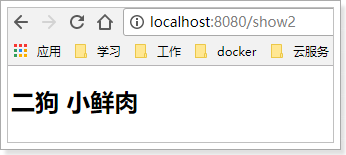
7、分支控制switch
这里要使用两个指令:th:switch 和 th:case
<div th:switch="${user.role}">
<p th:case="'admin'">用户是管理员</p>
<p th:case="'manager'">用户是经理</p>
<p th:case="*">用户是别的玩意</p>
</div>
需要注意的是,一旦有一个th:case成立,其它的则不再判断。与java中的switch是一样的。
另外th:case="*"表示默认,放最后

页面

8、JS模板
模板引擎不仅可以渲染html,也可以对JS中的进行预处理。而且为了在纯静态环境下可以运行,其Thymeleaf代码可以被注释起来:
<script th:inline="javascript">
const user = /*[[${user}]]*/ {};
const age = /*[[${user.age}]]*/ 20;
console.log(user);
console.log(age)
</script>
在script标签中通过th:inline="javascript"来声明这是要特殊处理的js脚本
语法结构:
const user = /*[[Thymeleaf表达式]]*/ "静态环境下的默认值";
因为Thymeleaf被注释起来,因此即便是静态环境下, js代码也不会报错,而是采用表达式后面跟着的默认值。
看看页面的源码:

我们的User对象被直接处理为json格式了,非常方便。
控制台:

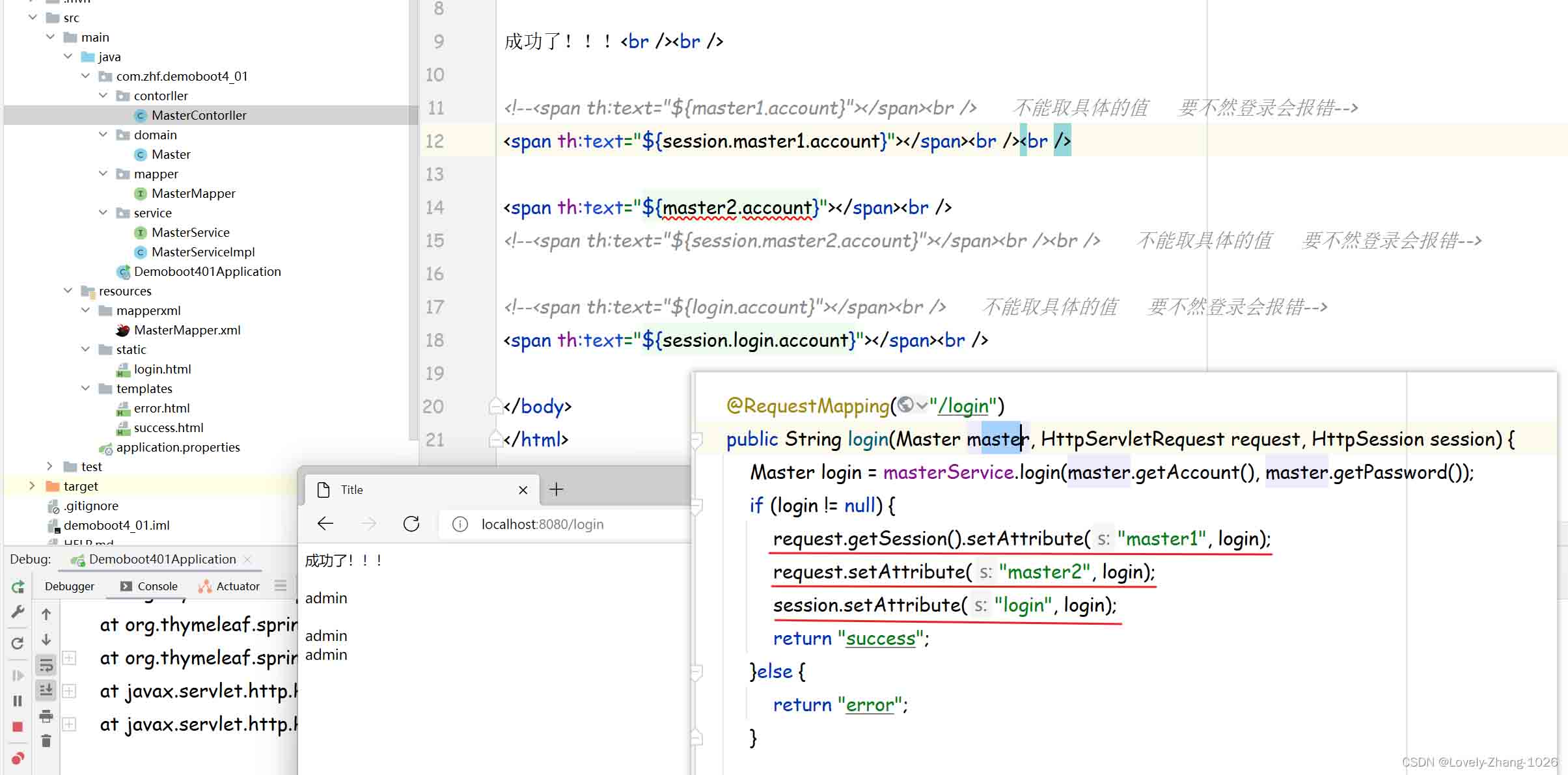
pom.xml依赖
<?xml version="1.0" encoding="UTF-8"?>
<project xmlns="http://maven.apache.org/POM/4.0.0" xmlns:xsi="http://www.w3.org/2001/XMLSchema-instance"
xsi:schemaLocation="http://maven.apache.org/POM/4.0.0 https://maven.apache.org/xsd/maven-4.0.0.xsd">
<modelVersion>4.0.0</modelVersion>
<groupId>com.zhf</groupId>
<artifactId>demoboot4_01</artifactId>
<version>0.0.1-SNAPSHOT</version>
<name>demoboot4_01</name>
<description>demoboot4_01</description>
<properties>
<java.version>1.8</java.version>
<project.build.sourceEncoding>UTF-8</project.build.sourceEncoding>
<project.reporting.outputEncoding>UTF-8</project.reporting.outputEncoding>
<spring-boot.version>2.3.7.RELEASE</spring-boot.version>
</properties>
<dependencies>
<!--热部署依赖插件-->
<dependency>
<groupId>org.springframework.boot</groupId>
<artifactId>spring-boot-devtools</artifactId>
<optional>true</optional>
</dependency>
<dependency>
<groupId>org.mybatis.spring.boot</groupId>
<artifactId>mybatis-spring-boot-starter</artifactId>
<version>1.3.2</version>
</dependency>
<dependency>
<groupId>org.springframework.boot</groupId>
<artifactId>spring-boot-starter-jdbc</artifactId>
</dependency>
<dependency>
<groupId>org.springframework.boot</groupId>
<artifactId>spring-boot-starter-thymeleaf</artifactId>
</dependency>
<dependency>
<groupId>org.springframework.boot</groupId>
<artifactId>spring-boot-starter-web</artifactId>
</dependency>
<dependency>
<groupId>mysql</groupId>
<artifactId>mysql-connector-java</artifactId>
<scope>runtime</scope>
</dependency>
<dependency>
<groupId>org.springframework.boot</groupId>
<artifactId>spring-boot-starter-test</artifactId>
<scope>test</scope>
<exclusions>
<exclusion>
<groupId>org.junit.vintage</groupId>
<artifactId>junit-vintage-engine</artifactId>
</exclusion>
</exclusions>
</dependency>
</dependencies>
<dependencyManagement>
<dependencies>
<dependency>
<groupId>org.springframework.boot</groupId>
<artifactId>spring-boot-dependencies</artifactId>
<version>${spring-boot.version}</version>
<type>pom</type>
<scope>import</scope>
</dependency>
</dependencies>
</dependencyManagement>
<build>
<plugins>
<plugin>
<groupId>org.apache.maven.plugins</groupId>
<artifactId>maven-compiler-plugin</artifactId>
<version>3.8.1</version>
<configuration>
<source>1.8</source>
<target>1.8</target>
<encoding>UTF-8</encoding>
</configuration>
</plugin>
<plugin>
<groupId>org.springframework.boot</groupId>
<artifactId>spring-boot-maven-plugin</artifactId>
<version>2.3.7.RELEASE</version>
<configuration>
<mainClass>com.zhf.demoboot4_01.Demoboot401Application</mainClass>
</configuration>
<executions>
<execution>
<id>repackage</id>
<goals>
<goal>repackage</goal>
</goals>
</execution>
</executions>
</plugin>
</plugins>
</build>
</project>
配置文件application.properties
# 应用名称 spring.application.name=demoboot4_01 # THYMELEAF (ThymeleafAutoConfiguration) # 开启模板缓存(默认值: true , 一般改为false,要不页面可能会不实时刷新) spring.thymeleaf.cache=false # 检查模板是否存在,然后再呈现 spring.thymeleaf.check-template=true # 检查模板位置是否正确(默认值 :true ) spring.thymeleaf.check-template-location=true #Content-Type 的值(默认值: text/html ) spring.thymeleaf.content-type=text/html # 开启 MVC Thymeleaf 视图解析(默认值: true ) spring.thymeleaf.enabled=true # 模板编码 spring.thymeleaf.encoding=UTF-8 # 要被排除在解析之外的视图名称列表,⽤逗号分隔 spring.thymeleaf.excluded-view-names= # 要运⽤于模板之上的模板模式。另⻅ StandardTemplate-ModeHandlers( 默认值: HTML5) spring.thymeleaf.mode=HTML5 # 在构建 URL 时添加到视图名称前的前缀(默认值: classpath:/templates/ ) spring.thymeleaf.prefix=classpath:/templates/ # 在构建 URL 时添加到视图名称后的后缀(默认值: .html ) spring.thymeleaf.suffix=.html # 应用服务 WEB 访问端口 server.port=8080 mybatis.mapper-locations=classpath:mapperxml/*xml mybatis.type-aliases-package=com.zhf.demoboot4_01.domain # 数据库驱动: spring.datasource.driver-class-name=com.mysql.cj.jdbc.Driver # 数据源名称 #spring.datasource.name=defaultDataSource # 数据库连接地址 spring.datasource.url=jdbc:mysql://localhost:3306/roadhelp?serverTimezone=UTC # 数据库用户名&密码: spring.datasource.username=root spring.datasource.password=root
以上为个人经验,希望能给大家一个参考,也希望大家多多支持自由互联。
